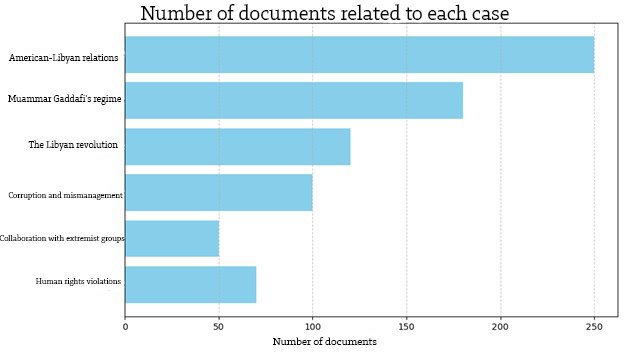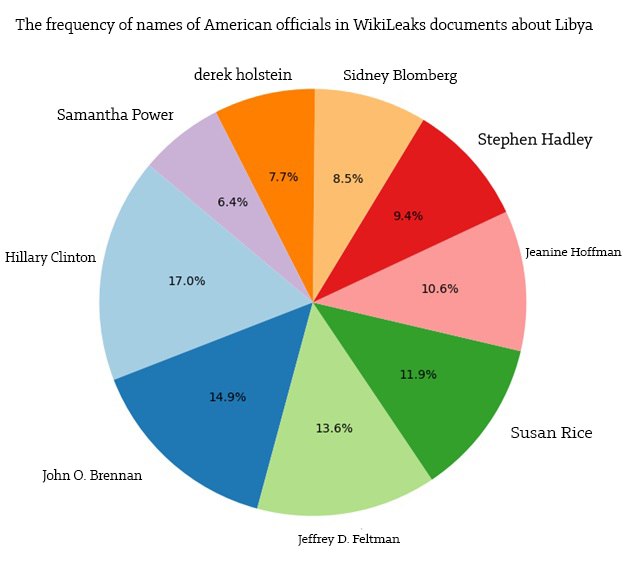The WikiLeaks documents return to the forefront of the event with the end of the Julian Assange case, and they once again show everything related to those documents with the Libyan issue, which occupied a prominent position in their leaks.
Although the issue of these documents dates back to 2010, and since that date many of the facts related to Libya have changed, but what Assange revealed shows that the course of the Libyan event was subject to perceptions that preceded the events of the “revolution,” and that the former US Secretary of State, Hillary Clinton, had a fundamental role in the overthrow the regime of President Muammar Gaddafi.
The documents presented by Assange clarify the hidden dimensions of American policy towards Libya and the repercussions that resulted from it, and on the other hand, they reveal the underlying dynamics of the Libyan crisis.

Initial copy of documents:
The documents cover many issues related to the essence of the Libyan issue, and the American mechanism for dealing with the Libyan “complex” that caused it a headache within the African continent. The issue was not only a hostile feeling towards former President Muammar Gaddafi, but also against a political system. The United States wanted to end it completely, and it is essentially linked to the sovereignty of African countries in general. These documents address basic points:
- US-Libyan relations, as the documents cover a period of time from 2004 to 2011 and include diplomatic, security and economic aspects, with the participation of senior officials such as Hillary Clinton.
- Analyzing the nature of Muammar Gaddafi’s regime, covering the period from 2006 to 2011, the documents revealed the style of government, foreign relations, and Gaddafi’s nuclear plans.
- The Libyan Revolution: The documents also covered the period from 2010 to 2012 and recorded the events that led to the revolution and civil war.
- Regarding Libyan internal affairs, the documents from 2008 to 2011 covered details related to the personality of President Gaddafi and his family, the president’s internal policy, cases of so-called corruption, and other matters.

The previous chart indicates that 250 documents dealt with American-Libyan relations, which were a very important topic during the period from 2004 to 2011, as there were many correspondences and details related to diplomatic, security, and economic cooperation between the two countries, while Muammar Gaddafi’s regime occupied 180 documents, and this great interest reflects Focusing on understanding and analyzing international relations, Gaddafi’s nuclear plans, human rights violations, and his authoritarian rule methods, as they put it, while 120 documents dealt with the Libyan revolution, while it was limited to 100 documents about mismanagement.
According to the documents, Hillary Clinton played a pivotal role in igniting the war on Libya. There are 40 documents that dealt with Hillary being Secretary of State, making her the most visible and reflecting her major role in formulating and implementing American foreign policy towards Libya.
There are also 35 documents about John Brennan, the former director of the CIA, which dealt with his major role in national security and counter-terrorism issues related to Libya.
32 documents revealed what Jeffrey Feltman did through his position as Assistant Secretary of State for Near Eastern Affairs, and the following chart shows the distribution of the names of American officials in Assange’s documents related to Libya:

Features of WikiLeaks Documents:
In an interview with Australian journalist John Richard Pilger, published on MR Online on June 26, 2023, Assange explained that Clinton was seeking to overthrow Gaddafi for domestic political and electoral gain, and revealed that WikiLeaks had more than 1,700 of Hillary Clinton’s 30,000 messages about… The Libyan file explains Clinton’s use of her agent, Sidney Blumenthal, who worked as a special advisor to President Bill Clinton during his presidency from 1997 to 2001, then worked as an advisor to Hillary during her presidential campaign in 2008, participated in correspondence via her private email, and directed events in Libya in a way that served her interests.
The messages published by WikiLeaks indicate that US President Barack Obama was initially opposed to the idea of military intervention in Libya, unlike Clinton, who was pushing strongly towards this direction, not only with the aim of controlling cheap Libyan oil, but rather was seeking to change the Libyan regime to increase its chances of Presidential elections, where the secret document entitled “The Ticking of the Libyan Clock” explains Clinton’s main role in destroying the Libyan state, which led to the death of about 40 thousand people and the spread of extremist organizations such as ISIS, in addition to the flow of refugees to Europe.
The documents revealed that Clinton was aware of Saudi Arabia and Qatar’s financing of ISIS, which adds another dimension to the complexity of American policy in the region. Assange explained through WikiLeaks documents that the war caused the spread of extremists and the flow of weapons to Syria, Libya and other African countries, which contributed to increasing chaos and instability. The documents revealed the involvement of Gulf countries such as Qatar and the UAE in fueling the conflict and financing some of the warring parties.
Assange stated that Qatar paid $50 million to one of the Libyan leaders to steal the Libyan army system. In addition, Turkey bargained with NATO to participate in the European Common Market in exchange for participation in the Libyan war.
The documents also showed that Britain owned about 90 billion pounds of Libyan money and prevented the Egyptian army from helping Gaddafi. As for Switzerland, it stole 9 million euros from Libyan bank accounts, and was helped in this by a person affiliated with the regime who defected after the money was divided during the Libyan crisis to join the new regime in Libya and becomes ambassador to Belgium.
The WikiLeaks documents also included that Libya possessed enormous wealth in oil and gas, and these resources were one of the main reasons that prompted foreign powers to intervene in Libya, and Gaddafi sought to obtain gold in exchange for oil instead of foreign currencies, which angered the Western powers that were relying on cheap Libyan oil.
Julian Assange’s case ended on June 25, 2024, when the founder of WikiLeaks was released from prison in the United Kingdom and left the country after an agreement with the American authorities.
Under this agreement, Assange pleaded guilty to one charge of violating the US Espionage Act, which will allow him to return to his homeland, Australia, but his documents about Libya constitute a window to understanding the hidden dimensions of international conflicts, and the role of major powers in directing events to serve their interests.
The comprehensive vision of the causes and repercussions of wars and conflicts in the Middle East and North Africa begins and ends with Washington’s strategies and its role in creating the tensions it imposes through various slogans that attempt to cover the nature of the conflicts it is waging in order to gain global influence.
Written by Nidal Al-Khedary
Sports events in Benghazi with the participation of Libyan football icons to promote communication and reject fanaticism
